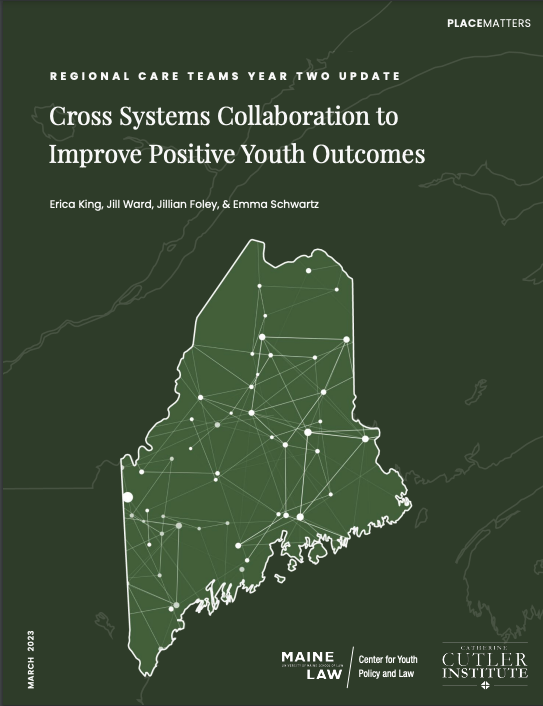A new report from USM’s Catherine Cutler Institute and Maine Law’s Maine Center for Youth Policy & Law provides an update on the Maine Department of Correction’s Regional Care Teams initiative
Regional Care Teams, a collaborative of the University of Southern Maine’s Catherine Cutler Institute, the Maine Department of Corrections (MDOC) and the Center for Youth Policy and Law at the University of Maine School of Law, released a report summarizing the progress of the its initiative over its second year of operation. Started in 2020 as a response to the COVID-19 pandemic, the initiative brings together youth-serving agencies, systems, local organizations, and communities in each MDOC region to directly support individual system-involved youth and their families, and to help inform broader systems change.
The report provides updated data on the second year of the initiative and recommends next steps to expand community intervention and reintegration support for youth, pre- and post- confinement at Long Creek Youth Development Center (LCYDC), hospitals, residential treatment and/or being unhoused. Since July 2020, the Regional Care Teams have served 144 youth and allocated over $50,000 in funds to meet emerging or urgent needs. In its second year, the teams’ initiative saw youth referrals double, with 103 referrals to support 75 individual youth received in Year 2.
These efforts built on the initiative’s goal to keep young people connected to services in the community and to avoid secure confinement in or returning to Long Creek. The report was authored by Erica King, Jillian Foley, and Emma Schwartz of the Justice Policy Program within USM’s Catherine Cutler Institute and Jill Ward of the Center for Youth Policy & Law at the University of Maine School of Law. “We are working to continue to expand opportunities for youth and family voices as central to the RCT process,” said Jill Ward, Center Director and RCT co-facilitator in Region 1. “In this second year, there were meetings in all three regions where the young person in need of support was able to participate.”

Both USM and Maine Law have helped design, implement, and co-facilitate the initiative which is funded in partnership with the MDOC. Other partners include the Maine Juvenile Justice Advisory Group (JJAG), which also allocated federal dollars to the project, and the Opportunity Alliance and Wings for Children and Families, who serve as fiscal agents for the initiative funding. These service provider partners also contribute their wraparound expertise to consult local teams to assess and address youth strengths and needs. Regional Care Team members include representatives from the Department of Health and Human Services, the Department of Education, the Department of Labor, Disability Rights Maine, and other direct service providers and advocates. “The structure of the RCTs allows public systems staff to respond to the urgent needs of justice-involved young people in real time, while working together to identify systemic problems and collaborate on solutions,” said Emma Schwartz, Research Analyst at the Catherine Cutler Institute, and a member of the statewide RCT team.
Together, these stakeholders respond to funds and case review referrals to connect youth to resources for basic needs, transportation, mental health, and education. In monthly care team reviews, team members discuss a particular young person’s strengths and needs with the aim of problem solving, leveraging new or existing resources, and lifting up challenges to policymakers who can assist. Emergency flexible funding is accessible to support unmet needs and strengthen positive outcomes. In its second year, the RCTs received referrals from emergency rooms, the judiciary, and behavioral health services, in addition to Juvenile Community Corrections Officers.
Building on its initial recommendations, the report identifies key next steps in expanding the capacity of housing, crisis, substance use, and case management services to respond to the needs of young people at risk of entering or returning from secure confinement. The needs that surfaced through case reviews, funds requests, monthly meetings, and stakeholder conversations continuously revealed how young people in the DOC system are categorically excluded from critical services. In addition, the authors suggest a need for a multi-system investment strategy to strengthen and expand the collaboration and reach more youth prior to their involvement with the legal system.
“Right now, Maine’s regional administrators, middle managers, and senior leaders are demonstrating the type of cross systems collaboration to strengthen and sustain a needs-based continuum of care at the local level,” said Erica King, a senior manager at the Center for Effective Public Policy, RCT founding member and advisor. “It’s time for Maine to strengthen investments in community reintegration, transition planning, and this type of collaboration to ensure that our young people have the connections to housing, employment, education and belonging that our older youth need to be successful in communities.”
For more information about the Regional Care Teams and the most recent data please visit placemattersmaine.org/regional-care-teams

